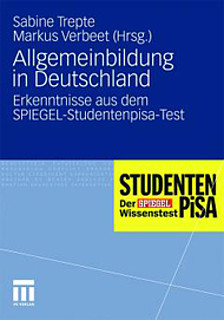General educational background in Germany: Findings from the SPIEGEL-Studentenpisa-Test
Sabine Trepte & Markus Verbeet (Eds.)
Who knows more and who knows less is a question that is troubling Germany. School reforms, TV quiz shows and discussions about the future of knowledge in the age of Google show that people want to know something about knowledge. In a large-scale study, SPIEGEL exposed more than 600,000 people to a knowledge test: the Student Pisa. The test results have now been evaluated and processed by scientists. It turns out that age and regular use of news have an influence on knowledge. The in-depth analyses reveal a number of surprises: student educators are outperformed to their fellow students in all subjects. General knowledge increases steadily and stabilizes from the age of 50. The best among the respondents use the Internet significantly more and television or radio less to inform themselves. Online news media in particular proved to be an "education driver."
The editors Prof. Sabine Trepte and Dr. Markus Verbeet address with their book "Allgemeinbildung in Deutschland" academics of all disciplines who are looking for a well-founded analysis of which groups know more than others and which socio-demographic and structural characteristics promote or hinder the acquisition of knowledge. In particular, teachers, professors, and those responsible for education will find answers to the questions: What are the reasons for gender differences in general education? What conclusions can be drawn for the quality of German higher education? Does regular media use positively affect general education?
For example, students of political science and history were found to have the best general education. Business administration, art and biology are in the midfield, while students of computer science or sports science are at the bottom. Students who earned their high school diploma in the states of Saxony, Saxony-Anhalt obviously begin their studies with an educational advantage; they perform better in knowledge tests than students from Bremen or Hamburg. Certain universities also prove to be incubators of general education. There are very large differences between universities, but these cannot always be attributed solely to research reputation and the number of supervising professors, but also to whether a university charges tuition fees and whether students consider the city where the university is located to be attractive.
In 20 chapters, the authors analyze which factors promote and hinder general education. They research and teach at the universities of Bochum, Camebridge, Hohenheim, Heidelberg, Innsbruck, Iowa, Munich, Münster, Vienna, Wuppertal, at the Fraunhofer Institute and at the Science Center Berlin. Their analyses are based on SPIEGEL's Student Pisa, a large knowledge test with 45 questions that was conducted in 2009. The questionnaire includes, for example, a knowledge test on politics, a knowledge test on history and a knowledge test on economics, a knowledge test on natural sciences and a knowledge test on culture. The data set enables detailed evaluations by university, state and in dependence on socio-demographic factors, which were so far not possible on such a large scale. Two studies, also published in the book, demonstrate the reliability and validity of the Student-Pisa. Accordingly, the knowledge test can also be used for other studies of general education. The test questions of the Student-Pisa with all answers are provided in the appendix of the book.
Book: 367 p. with 119 figures and 65 tables
Publisher: VS; Auflage: 1 (2010)
ISBN: 978-3-531-17218-7

